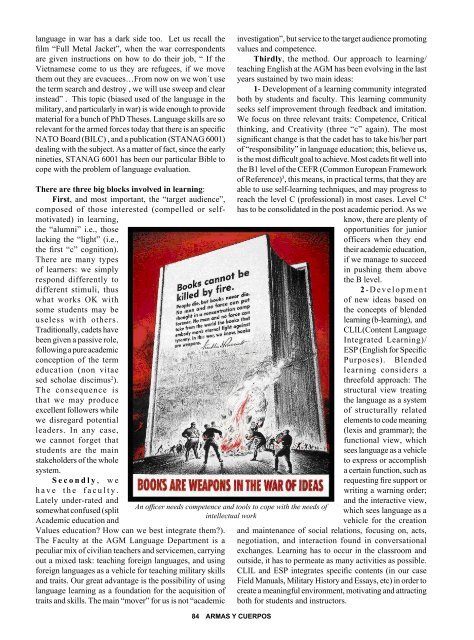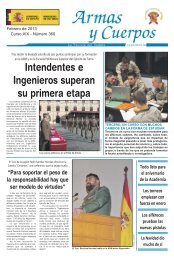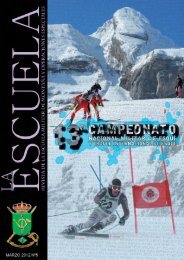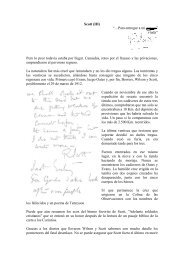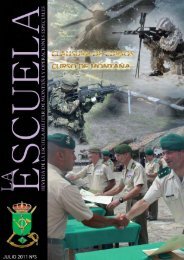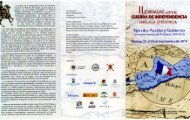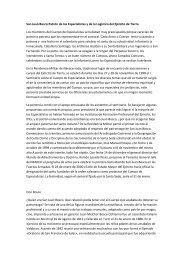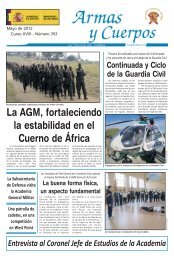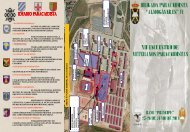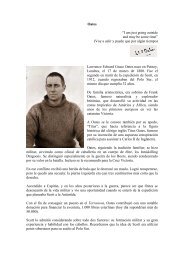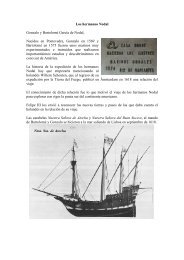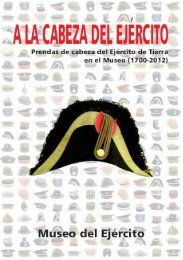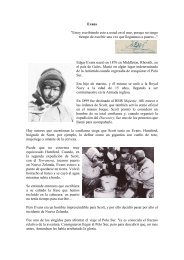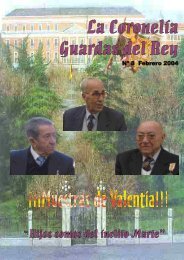Revista Armas y Cuerpos nº 123 - Ejército de tierra - Ministerio de ...
Revista Armas y Cuerpos nº 123 - Ejército de tierra - Ministerio de ...
Revista Armas y Cuerpos nº 123 - Ejército de tierra - Ministerio de ...
You also want an ePaper? Increase the reach of your titles
YUMPU automatically turns print PDFs into web optimized ePapers that Google loves.
language in war has a dark si<strong>de</strong> too. Let us recall the<br />
film “Full Metal Jacket”, when the war correspon<strong>de</strong>nts<br />
are given instructions on how to do their job, “ If the<br />
Vietnamese come to us they are refugees, if we move<br />
them out they are evacuees…From now on we won´t use<br />
the term search and <strong>de</strong>stroy , we will use sweep and clear<br />
instead” . This topic (biased used of the language in the<br />
military, and particularly in war) is wi<strong>de</strong> enough to provi<strong>de</strong><br />
material for a bunch of PhD Theses. Language skills are so<br />
relevant for the armed forces today that there is an specific<br />
NATO Board (BILC) , and a publication (STANAG 6001)<br />
<strong>de</strong>aling with the subject. As a matter of fact, since the early<br />
nineties, STANAG 6001 has been our particular Bible to<br />
cope with the problem of language evaluation.<br />
There are three big blocks involved in learning:<br />
First, and most important, the “target audience”,<br />
composed of those interested (compelled or selfmotivated)<br />
in learning,<br />
the “alumni” i.e., those<br />
lacking the “light” (i.e.,<br />
the first “c” cognition).<br />
There are many types<br />
of learners: we simply<br />
respond differently to<br />
different stimuli, thus<br />
what works OK with<br />
some stu<strong>de</strong>nts may be<br />
useless with others.<br />
Traditionally, ca<strong>de</strong>ts have<br />
been given a passive role,<br />
following a pure aca<strong>de</strong>mic<br />
conception of the term<br />
education (non vitae<br />
sed scholae discimus 2 ).<br />
The consequence is<br />
that we may produce<br />
excellent followers while<br />
we disregard potential<br />
lea<strong>de</strong>rs. In any case,<br />
we cannot forget that<br />
stu<strong>de</strong>nts are the main<br />
stakehol<strong>de</strong>rs of the whole<br />
system.<br />
Secondly, w e<br />
have the faculty.<br />
Lately un<strong>de</strong>r-rated and<br />
somewhat confused (split<br />
Aca<strong>de</strong>mic education and<br />
Values education? How can we best integrate them?).<br />
The Faculty at the AGM Language Department is a<br />
peculiar mix of civilian teachers and servicemen, carrying<br />
out a mixed task: teaching foreign languages, and using<br />
foreign languages as a vehicle for teaching military skills<br />
and traits. Our great advantage is the possibility of using<br />
language learning as a foundation for the acquisition of<br />
traits and skills. The main “mover” for us is not “aca<strong>de</strong>mic<br />
84 ARMAS Y CUERPOS<br />
investigation”, but service to the target audience promoting<br />
values and competence.<br />
Thirdly, the method. Our approach to learning/<br />
teaching English at the AGM has been evolving in the last<br />
years sustained by two main i<strong>de</strong>as:<br />
1- Development of a learning community integrated<br />
both by stu<strong>de</strong>nts and faculty. This learning community<br />
seeks self improvement through feedback and imitation.<br />
We focus on three relevant traits: Competence, Critical<br />
thinking, and Creativity (three “c” again). The most<br />
significant change is that the ca<strong>de</strong>t has to take his/her part<br />
of “responsibility” in language education; this, believe us,<br />
is the most difficult goal to achieve. Most ca<strong>de</strong>ts fit well into<br />
the B1 level of the CEFR (Common European Framework<br />
of Reference) 3 , this means, in practical terms, that they are<br />
able to use self-learning techniques, and may progress to<br />
reach the level C (professional) in most cases. Level C 4<br />
has to be consolidated in the post aca<strong>de</strong>mic period. As we<br />
know, there are plenty of<br />
opportunities for junior<br />
officers when they end<br />
their aca<strong>de</strong>mic education,<br />
if we manage to succeed<br />
in pushing them above<br />
the B level.<br />
2 - D e v e l o p m e n t<br />
of new i<strong>de</strong>as based on<br />
the concepts of blen<strong>de</strong>d<br />
learning (b-learning), and<br />
CLIL(Content Language<br />
Integrated Learning)/<br />
ESP (English for Specific<br />
Purposes). Blen<strong>de</strong>d<br />
learning consi<strong>de</strong>rs a<br />
threefold approach: The<br />
structural view treating<br />
the language as a system<br />
of structurally related<br />
elements to co<strong>de</strong> meaning<br />
(lexis and grammar); the<br />
functional view, which<br />
sees language as a vehicle<br />
to express or accomplish<br />
a certain function, such as<br />
requesting fire support or<br />
writing a warning or<strong>de</strong>r;<br />
and the interactive view,<br />
An officer needs competence and tools to cope with the needs of<br />
which sees language as a<br />
intellectual work<br />
vehicle for the creation<br />
and maintenance of social relations, focusing on, acts,<br />
negotiation, and interaction found in conversational<br />
exchanges. Learning has to occur in the classroom and<br />
outsi<strong>de</strong>, it has to permeate as many activities as possible.<br />
CLIL and ESP integrates specific contents (in our case<br />
Field Manuals, Military History and Essays, etc) in or<strong>de</strong>r to<br />
create a meaningful environment, motivating and attracting<br />
both for stu<strong>de</strong>nts and instructors.


